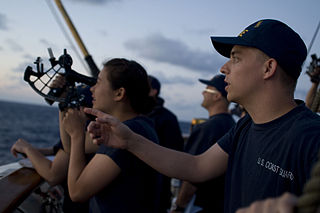The maritime community is justifiably nervous about the potent punch that hackers could deliver by breaking into the company computer or tangling up the world’s GPS.
Earlier this month, the Coast Guard reported the latest cyberscare – that a U.S. port had experienced numerous attempts by an unauthorized source to infiltrate its website. In late November and early December, it had observed 432 attempts – all unsuccessful – to compromise its website by attempting to exploit vulnerabilities in Joomla, the content management system used by port staff to manage the site.
In a strange way, however, this growing threat has had a positive effect by reviving hacker-proof, old school navigation skills and techniques.
In other words, the sextant is making a comeback.
A celestial navigation session on the fantail of the Coast Guard Cutter Eagle in 2013. Eagle navigated primarily using celestial navigation techniques during the 2013 cadet training deployment. USCG photo.Celestial navigation was taught at the U.S. Naval Academy from its founding in 1845 until the course was abolished in 1998 in favor of electronic navigation.
Now, some 15 years later, the academy has realized that computers have limitations, and, as most old timers would tell you, knowing how to navigate the stars is the true mark of a mariner.
Beginning last fall, the academy dusted off the sextants, broke out the nautical almanac and navigational tables and relaunched a three-hour course that introduces future officers to the concept of measuring the angles of stars. The class of 2017 will be the first in years to graduate having been taught celestial navigation.
Citing the real threat of cyberattacks, the academy said such knowledge would be essential should an intrusion shut down a ship’s communication and navigation systems or worse, cripple or jam the GPS satellites.
GPS provides highly accurate readings for navigation – calculating a location within a few feet – while a sextant is less exact, showing a location within 1.5 miles. But that’s still pretty darn good if you’ve lost your GPS signal, all hell has broken loose, the lights go out, and you have no other choice to keep your vessel operating.
Interestingly, the Coast Guard Academy teaches the sextant on its Eagle tall ship training vessel, and the U.S. Merchant Marine Academy still considers celestial navigation an important part of its curriculum and even advised the USNA in its celestial relaunch.
So, how well do you know your stars?




